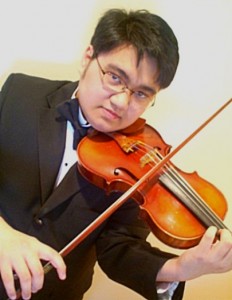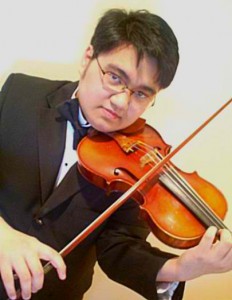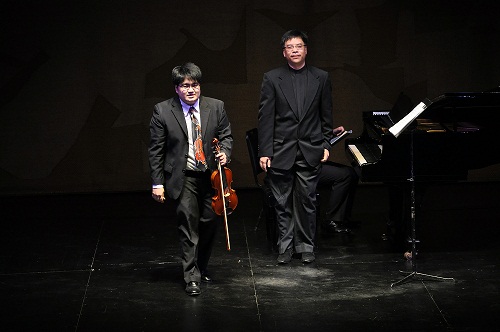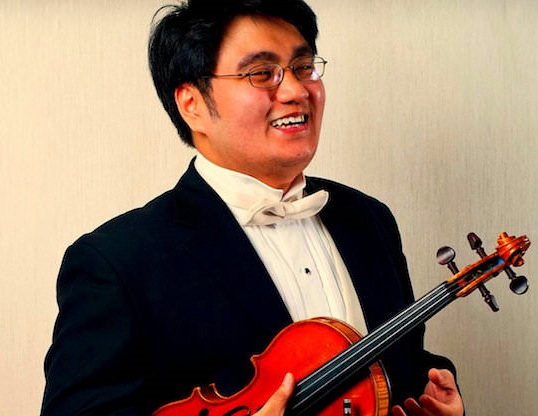By PABLO TARIMAN
MANY Filipinos do not know that 19-year-old violinist Diomedes Saraza, Jr., the latest star soloist of the prestigious Juilliard School in New York, is the first Filipino Outstanding Academic Achievement awardee of U.S. President Barack Obama’s Education Awards Program.
Saraza is here for a solo concert with the Philippine Philharmonic on February 11 at the Cultural Center of the Philippines (CCP) main theater. He is replacing Chinese violinist Tianwa Yang, who couldn’t make it to Manila, as soloist in the Tchaidskovsky D major concerto
 The young violinist became an Obama awardee during his senior year at the St. Raymund High School for Boys in Bronx, New York where he was also nominated as one of the best high school students of that U.S. state.
The young violinist became an Obama awardee during his senior year at the St. Raymund High School for Boys in Bronx, New York where he was also nominated as one of the best high school students of that U.S. state.
“The Obama citation was a recognition of all my hard work in school,” Saraza said. “I was in the first honor roll over the past four years in my high school years and I shared the award with 15 others. My parents of course were happy and proud.”
The Filipino violin wizard — also a former prizewinner of the National Music Competition for Young Artists — said however that while he became an Obama awardee, he has not actually met the president of the United States.
“I have never met President Obama personally but I find him a very well-mannered man and a very effective speaker,” Saraza said. “The presidency fits him. I support him and hope that all his plans for the US go along well.”
Saraza is thus far the only young Filipino violinist accepted in Juilliard School since the 1970s when the last Filipino violin student that made it there was Joseph Esmilla. He is now a sophomore under the tutelage of Prof. Stephen Clapp.
Saraza had his New York concert debut with the New York Symphonic Arts Ensemble at Julia Richman Auditorium. He won the Juilliard Competition 2010, playing William Schumann’s “Violin Concerto.” Recently, he performed at the Paul Hall of the Juilliard School for an all-sonata concert called “Sonatenabend”.
He was also a prizewinner of the Mannes Concerto Competition, which enabled him to perform with the Mannes Philharmonic under the baton of Michael Adelson, assistant conductor of the New York Philharmonic.
Two years ago, he electrified Philamlife Theater audiences in Paganini’s “D Major Violin Concerto” with the Manila Symphony, earning a rousing standing ovation.
“The key to a good performance is to focus consistently during the concert no matter what happens,” he said. “All the things that you have practiced must stay in the performance.”
Saraza said he was very happy with his last Paganini concerto, which was his first performance with an orchestra of the fiendishly difficult “D Major concerto.”
“The most difficult part of playing this concerto are the notes themselves,” he said. “They require a huge amount of energy and violin technique. The thing that makes it more difficult is putting the right character on the notes.”
He recalled: “My teacher used to say that this piece should sound easy and playful even though the notes are hard. You can’t just focus on hitting the notes right because they require from the soloist the right mood and character — not to mention various shapes and color.”
Saraza was also a violinist in the quartet which won first prize in the American Teachers League Young Artists Competition which led to a Carnegie Hall performance. He was also pre-selected to compete at the 52nd International Violin Competition in Italy three years ago but was sidetracked by visa problems.
“I passed the pre-selection of the Paganini Competition and was invited to join,” he recounted. “It wasn’t that clear why I was denied visa but I surmised Italy had problems with Filipino nationals because of those stories about kidnapping and killings in Mindanao.”
For the Paganini pre-selection round, he performed on record one Paganini Caprice and two movements of Mozart.
He said: “It wasn’t that tough because it wasn’t live. The recording just needed to be perfect or close to perfect.”
The first and last Filipino prizewinner of the Paganini competition was Carmencita Lozada, who passed away in 2007.
On the future of classical music in the Philippines, Saraza said: “We have a long way to go. We still need a lot of support. It’s very rare to see sold-out classical concerts here in the Philippines. Support from more people is a must if we want the future of classical music in the Philippines to flourish.”


